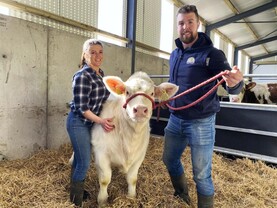The Department of Agriculture has confirmed bird flu (avian influenza H5N1) in samples from a turkey flock in Co Monaghan.
The Irish Farmers Journal understands that all birds, some 30,000, on the premises will now be humanely destroyed to prevent the disease spreading further.
Restriction zones are being set up around the area where additional movement control and surveillance measures will be put in place.
A protection zone of at least 3km radius from the infected holding and a surveillance zone of at least 10km radius will be put in place.
This is the first case of the highly pathogenic bird flu in domesticated birds in the Republic of Ireland, following multiple cases in wild birds in a number of counties across the country in recent weeks.
A census of all holdings within the protection and surveillance zones will be conducted and procedures put in place to control movements of live poultry, other captive birds, hatching and table eggs, used litter, manure and slurry from poultry holdings.
There will be controls on movement of poultry feed to suspect and/or infected premises and biosecurity measures applied to the movement of feed delivery vehicles between poultry farms in the restriction zones.
European cases
Outbreaks of highly pathogenic avian influenza have also been identified in poultry flocks in Italy, Poland, Germany, the Netherlands, Denmark, Hungary, Estonia, Czechia, Norway, Bulgaria, Belgium and the UK since early October.
There is no evidence of risk associated with consumption of poultry meat or poultry meat products.
The Health Protection Surveillance Centre has confirmed that although the H5N1 subtype can cause serious disease in poultry and other birds, no human infections with this virus have been reported in Europe and therefore risk to humans is considered to be very low.
Do not handle sick or dead birds
Members of the public are, as always, advised not to handle sick or dead wild birds and to report sick of dead wild birds to the Regional Veterinary Office or contact the Department’s disease hotline on 01-492 8026.
An early warning system is in place with Birdwatch Ireland, the National Parks and Wildlife Service and the National Association of Regional Game Councils with regard to surveillance for signs of disease in wild birds.
The Department of Agriculture said poultry flock owners should remain vigilant for any signs of disease in their flocks, maintain strict biosecurity measures and report any disease suspicion to their nearest Department regional veterinary office.
Confine birds
Minister for Agriculture Charlie McConalogue has made regulations under the Animal Health and Welfare Act 2013 requiring flock keepers to confine all poultry and captive birds in their possession or under their control in a secure building, to which wild birds or other animals do not have access, and to apply particular biosecurity measures.
These are due to come into force on 22 November.
The Department continues to closely monitor and assess the disease situation and is in regular contact with industry stakeholders and colleagues in Northern Ireland.
Clinical signs that poultry keepers should look for in their birds include a swollen head, discolouration of neck and throat, loss of appetite, respiratory distress, diarrhoea and fewer eggs laid – although these vary between species of bird.
If you suspect disease in your own flock, notify the nearest Regional Veterinary Office or ring the Avian Influenza Helpline: 01-607 2512 (Outside of office hours: 01-492 8026).






 This is a subscriber-only article
This is a subscriber-only article










SHARING OPTIONS: